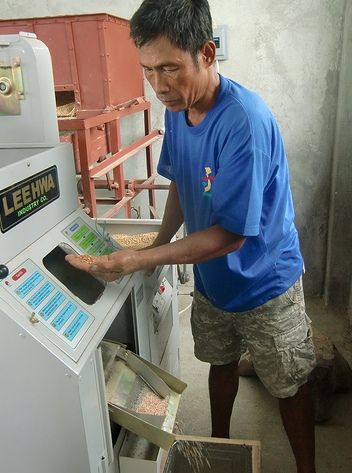Rice, Rain and Renewal

I ate rice every day during my recent 10-day visit to the Philippines. Most days, I ate it two or three times. So when I think about my trip, rice is one of the first things that comes to mind.
But for many Filipinos, rice is an even more important part of their lives. The Episcopal Church of the Philippines (ECP), a local Episcopal Relief & Development partner, works with a number of communities that grow rice as their main crop. ECP engages with rice farmer cooperatives in a great variety of ways, constantly working with them to improve their efficiency, incomes and impact on the environment.
The program has collaborated with these groups to create large flat areas and storage buildings for farmers to dry their rice after harvest, and keep it safe until it’s sold (see October 2011 blogs by Dawn Murdock). They also have purchased machines to process the rice.
In the first picture, a farmer in one of the cooperatives is showing me a red rice variety they recently started growing, with the husks removed by their new machine. They can now sell this rice for a premium in the market, rather than having to sell to intermediary processors to be husked.
Environmental conservation is also in the front of community members’ minds, as more frequent and heavy monsoon rains are causing worsening erosion and landslides. ECP is working with a women’s group on an innovative way to make charcoal. Rather than using wood from the forests, they are using rice husks, which are normally discarded as waste, to create charcoal briquettes that actually burn longer than the wood variety. When we visited, some members of the women’s group were bagging their rice husk charcoal for the market.
None of this rice production would be possible without the plentiful rains that come to the country each year. I believe it rained as often as I ate rice during my visit – sometimes coming down so heavily that you couldn’t see in front of you.
A few days after I left, the region was hit by particularly heavy rains, winds and floods, which was difficult for many farmers. But I know that the work the Church is doing helped families to recover more easily – through their improved food stores, increased incomes and, just as importantly, the solidarity and trust built up through their cooperative groups.
———-
Sara Delaney is a Program Officer with Episcopal Relief & Development.


